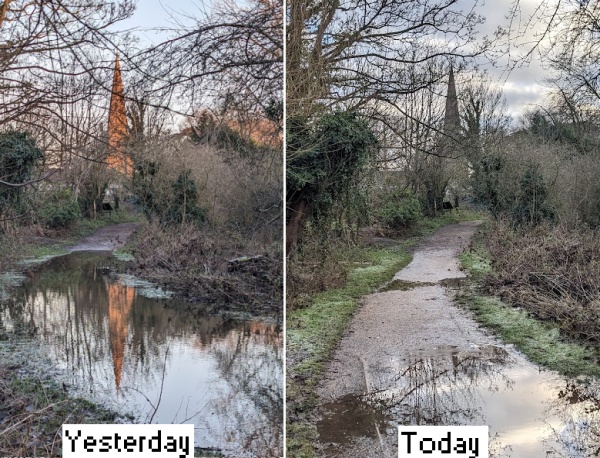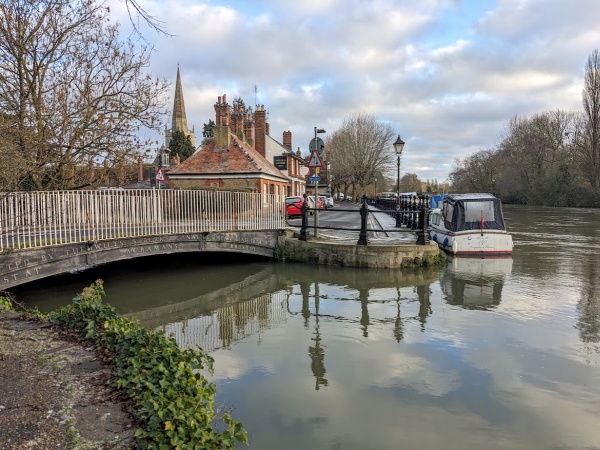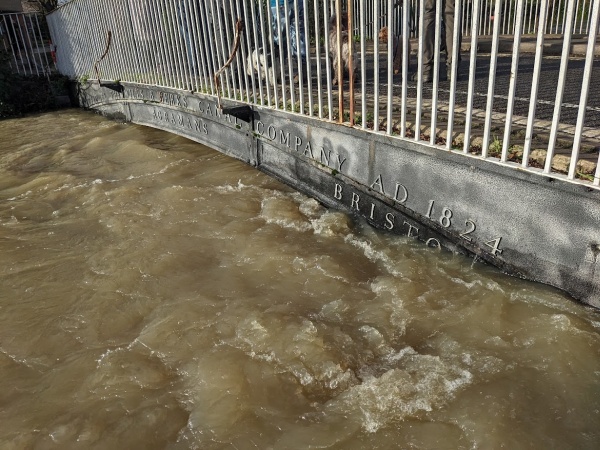
Good news for walkers in Abingdon! The Ock Valley Walk is dry enough to explore today (except maybe around Tesco).

The water looks calmer at St Helen’s Wharf. This morning, you could see a clear space between the water and the bridge’s iron arch.

At high tide on Saturday, part of the word ‘Bristol’, and houses in Abingdon were underwater.
The Abingdon Herald had a front-page article, on Wednesday, about the call for action by the environment agency (EA) on improving the town’s flood defences. Regarding this, I have two pieces on information in my inbox. Two schemes were being explored: a flood storage area west of the A34, and temporary flood barriers. An email from the EA from December 2018 said, ‘Since our last newsletter we have been continuing to develop the design for a flood storage area. Based on our more detailed design information we now know the cost of the flood storage area to be much greater than our earlier estimate. To justify continuing work to develop plans for a flood storage area our partnership would need to secure a large amount of additional funding from other partners and businesses. The partnership do not think we will realistically be able to find the required funding. This means that we are not able to continue developing plans for the flood storage area at this time.’ Partners included local councils and businesses.
They said,‘We are continuing our work to investigate options for Natural Flood Management which could help to reduce flooding in Abingdon. We have also identified where Temporary Flood Barriers could help reduce the impact of flooding for specific areas in Abingdon.’
There was a more recent update from the EA to the Tithe Farm and Ladygrove Newsletter in August 2023. It said, ‘We reviewed this plan following problems experienced with barriers in the Midlands. The result of the review was that we would be unable to erect it in time to prevent flooding. As a consequence, we withdrew the plan. This means that there won’t be any permanent structures or temporary barriers to protect you from the River Ock.’
If only there were a multi billion pound water company that were dumping millions of tones of raw sewage in to our rivers and streams that could be fined enough to fund this and indeed all other related schemes….if only.
The die was cast when the water industry was given to the private sector in 1989. Why should a company owned largely by people abroad, care about sewage in rivers, unnecessary reservoirs etc? . Many of those criticising Thames Water will vote for the status quo at the next general election and elect a government whose rule is that the free market is good and any element of state control is bad.Businesses are there for profit so you cannot moan when they cut corners. As I say the die was cast when the government sold off our publically owned assets in the 80s and have spent the last 40 years beating down the public sector… but the public gets what the public wants and they deserve it!
… if only … the Government would pull back the £billions they gifted their cronies, such as the Covid Profiteers, and not be so incontinent with taxpayers funds then they would be able to afford some large-scale, essential infrastructure….
… if only … Governments hadn’t sold regional public service monopolies, large chunks of which have landed in the hands of non-benign foreign governments … who’da guessed that might happen in a ‘free market’? Obvously not the nincoompoops in Whitehall (cue our own Moran just surfacing on Radio 4’s Today programme as I type).
How comfortable are you with such as the Chinese owning local sewage works/systems? Just imagine …. one morning we really might wake up swimming in ….
Spot on Newcomer!
Oooh – Layla? Did she say she’d write a strongly worded email?
Am I correct in thinking that one of the big local objections to the Oxford Flood Relief scheme was that it would push flood water further down river towards Abingdon ? I wonder if this has been taken into account by the Environment Agency ?
Probably, but could be a case of big fish, small fish. the fast draining of Oxford’s water would become Abingdon’s problem.
I read a fascinating article yesterday about how some farmers have been switching to more natural drainage for their land, allowing naturally wet and boggy areas more space, putting in or encouraging reeds, willow trees and shrub growth, and putting curves /meanders back in streams and ditches, which increases water catchment space. It makes sense that a meandering water course takes more water than a straight as a ruler ones, doesn’t it? These re-wilded areas with the trees and greenery can take up more floodwater, their banks don’t suffer from soil erosion so much thanks to the tree roots, and the re-worked areas also provide more valuable habitat for wildlife of all sorts.
Abingdon is quite fortunate that it has -mostly- left its floodplain be, but perhaps in view of wetter periods and Oxford’s plans to jet water downstream, more can be done to naturally increase water uptake on it, putting back more meandering ditches and backwaters rather than straight ones, and more willow, shrub and reed planting. It’s an idea worth investigating I think.
ETA –
What I don’t understand is that one image I saw of Oxford’s flood alleviation scheme the new stream was a straight line! It needs to meander, most definitely…
Kris, please re-asses your post through the lens of cost/profit. Then you will know if what you suggest makes any kind of sense.
Ah it all revolves around money, sadly. Hence why we are still burning fossil fuels, heating the planet up. Because it’s making a few people at the top a lot of money.
Sadly also, things like “the big society” is not also so viable -even if a few thousand Abingdonians volunteered to work on floodplain project and help with all the digging and planting needed, people are working more than ever with less time to give for free because of higher household bills due to very greedy mega companies – pardon me – global wars -affecting supply and pushing up costs. And if they aren’t working they are caring, or unwell, in some cases due to being unable to get needed healthcare due to cuts/NHS issues. Due again to corporate and governmental greed.
It’s odd that greed is not seen as a human sickness, but as success, even though it’s so destructive to the world and our habitat.
Is a ‘flood storage area’ another name for a reservoir, I wonder?